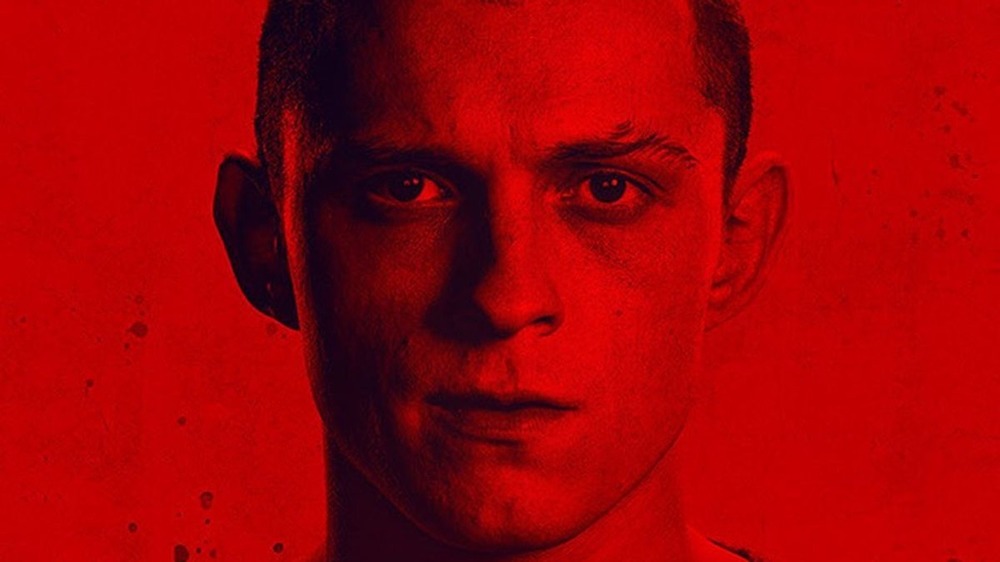Cherry Review: A Big Bowl Of American Tragedies With Tom Holland On Top
Sitting through an entire movie about a tempestuous romance can be tough. Watching a war film — with blood and guts and death and despondency — can leave you so drained that you feel like you just did a tour of duty yourself. If you're watching a film about PTSD, prison and bad life decisions compounded by loneliness and a jaded worldview, that can be exhausting. And, oh yeah — movies about junkies, although excellent when well done, can also be something of a slog.
The Russo brothers' Cherry is like a grocery list of things that are difficult to endure. For two hours and twenty-one minutes, it ticks along from one genre to the next, like a decathlon of depressing topics, almost daring you to keep watching. But here's the strange thing: it is trying so hard to be a spectacular film. Which might be why it's so maddening.
Baby-faced Tom Holland stars in the film, which makes it even more difficult to watch as he gets chewed up and spit out by America's war machine, war on drugs, failure to support its veterans, and a general lack of compassion by pretty much anyone around him. Props to Holland for taking on such a risky role, and his performance is both intense and brave, but it seems like an entire generation is about to tune in for their favorite Spidey and instead get your friendly neighborhood nihilist.
Based on a novel written by Nico Walker — who wrote it in federal prison — Cherry recounts a man's road to ruin. When we first meet the main character (who is never really named, although various sources list him as "Cherry"), he is young and aimless, coming of age but unsure what to do with himself. This is when he falls for Emily (Ciara Bravo, A Teacher), a beautiful girl who seems to argue hard, and make up even harder. They immediately get to work breaking up, getting back together, discussing marriage and moving away from one another.
It is during one of these relationship time-outs that Holland's character impetuously enlists in the army — and if you're looking to make a drinking game out of Cherry, tip your elbow every time you find yourself mumbling "That's a bad idea." Basic training is brutal, and what he sees in Iraq is as soul-crushing as it is impossible for him (as a medic) to do anything about other than stuff people's outsides back inside and deal with the demons that accompany such carnage.
Somehow he makes it back home alive, which leads the film into depictions of PTSD, self-medication, and a combative marriage to Emily — who now seems more like a concept than a human being. At this point, you might feel like one of the people sitting next to Robert Hays in Airplane!, dousing yourself in gasoline as this relentless tale of tragedy mercifully comes to a close. It's also about the time Holland's narration says "...and that's when we became addicts..." and you realize there's still an hour to go.
The specter of Emily
It would be one thing if Cherry was simply a listless, ill-conceived star vehicle designed to show us that a Hollywood star has more thespian chops than we realize — a forgettable misfire along the lines of Ashley Judd's Helen, Sandra Bullock's 28 Days or Bill Murray's The Razor's Edge. But Cherry leaps off the screen at you every chance it gets, with the kind of swagger and self-assuredness that usually signifies a film that has the goods. It's like watching somebody strut into a room thinking he owns it, oblivious to the toilet paper hanging off his shoe.
The brothers Russo certainly never let you forget that they are behind the camera, employing all sorts of complicated shots, jazzy titles, breaking of the fourth wall and other attention-grabbing techniques. In addition to their resistance towards giving the main character a name, other characters have names like "Pills & Coke" or "Black" (an ominous man barely glimpsed, whose face seems to be covered in some mixture of tattoos and facial hair). At one point, Holland seeks help from an uncaring physician (Thomas Lennon) whose desk placard reads "Dr. Whomever"; the banks he robs to support his habit have names that riff off well-known institutions (Capitalist One, S***ty Bank, etc); this all feels like some kind of ripoff of films like Repo Man and Natural Born Killers, stripped of any commentary beyond the cheap joke of a subversive logo.
So what is Cherry trying to say exactly? It's hard to tell beyond "life sucks," but there sure are some divine moments of directorial inspiration that could have yielded meaty moments if given the chance for fuller exploration. During basic training, Holland's character says that he feels like they're all children playing grown up — and we see them transform into children wearing oversized military uniforms. Another brief shot has soldiers dancing in a Busby Berkeley-esque overhead formation.
Everything is touched upon so briefly, the next topic moved to so breathlessly, that it's a reminder of that old axiom: Jack of all trades, master of none. If you want to watch a great film about the madness of the battlefield, watch Full Metal Jacket or Jarhead or Three Kings or The Big Red One or Saving Private Ryan or a dozen other better movies. If you want to dive into the mind of a junkie, watch Requiem for a Dream or Trainspotting or Bug or Naked Lunch. If you long for doomed lovers, reach for Sid & Nancy, Blue Valentine. Want a better movie about bank robbing? That would be, literally, any movie ever made about bank robbing.
War is hell
Cherry feels like it was assembled from many, many other movies and is walking you through their greatest hits without making any lasting impressions of its own.
But if you ever wanted to see the inside of Tom Holland's anus, this is the movie for you. If you ever wanted to watch actors vomit — so, so much vomiting — be sure to get yourself a ticket. People stabbing themselves repeatedly with a hypodermic needle? Barely acknowledged cruelty to children, homophobia, racism, and suicide? At least three scenes that inexplicably take place in a Subway? It's all here, presented in a manner which could best be described as aggressively unpleasant.
Without giving anything away, it's safe to say that the most insufferable part of Cherry comes if you can make it to the very end, in a sequence titled "Epilogue." Mostly silent except for the music on the soundtrack, it depicts a lengthy jail term. It aims to convey two notions: that Holland's character is contrite, and that he and Emily have a love that will endure. Both are completely contrary to everything the audience has just spent the last two hours watching.
So, you might think, this "Epilogue" is the time for Cherry to shine — to bridge that chasm with a tremendously well-written scene that has these characters explaining such fundamental transformations in their very fabric of being; there must be a show-stopping moment for Holland and Bravo to convince us that everything going forward will be different than everything we've just seen.
If you believe that, you're similarly choosing to ignore everything about the movie up until now. Instead, Cherry chooses to rely on an old filmmaker cheat code, using the actor's faces to make up for dialogue they can't write. It's another frustrating decision in a Reader's Digest movie, content to shock and awe with bits and pieces and ideas done better by other films, thrown at you in what feels like a drive-by shooting.
By the end of the film, you can be forgiven if you feel like you just endured the most toxic relationship of your life, did a tour of duty in Iraq, and went through rehab — and learned absolutely nothing in the process. There's little here to reflect upon, little to move you — just more reasons to conclude that Cherry is the pits.


